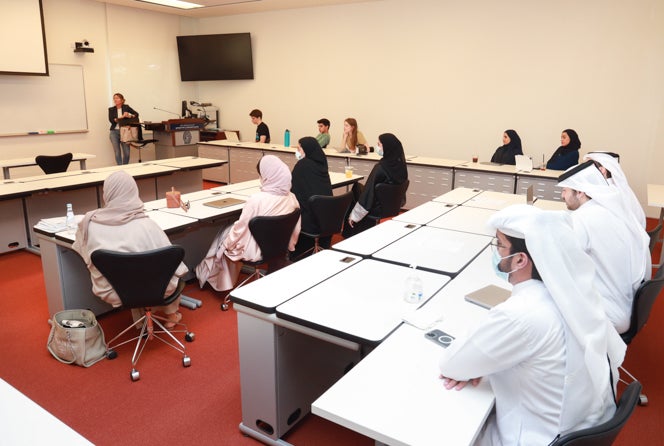Unconventional Class With Georgetown Professor Attracts Qatari Students

To bring the study of Qatari culture, history, and society to life, Dr. Rogaia Abusharaf, a professor of anthropology at QF partner Georgetown University in Qatar (GU-Q), developed a course on Qatar Ethnography that connected students to documentarians, architects and historians of Qatar who shared their own explorations of Qatar’s development and offered inspiration for a final documentary assignment.
To prepare students to produce their short documentary film, the course culminated with respected broadcast journalist Stephanie Dekker of Al Jazeera English, who spoke about her experience in producing a documentary about the endangered habitat of Qatar’s whale sharks “What a privilege: Swimming with endangered whale sharks in Qatar” and what they represent for the global environmental heritage.
Dekker’s talk to the students, which included 16 Qataris, focused on sharing her techniques and tips for producing a documentary, from collecting the research, talking to experts and shooting the footage, and how she used the film to raise funds and awareness for stopping habitat loss.
Other experts brought to the class included Professor Muhammad Hammam Fikri, the author of the book “Driving Force Behind Qatar Heritage”, who provided insight on Qatar’s travel literature and what can be learned from secondary sources such as maps and documents.
Independent Qatari writer, director, and filmmaker Hamida Issa showed her film “The Elevator” to the class, leading a discussion on cultural issues in Qatar relating to the environment and returning to cultural roots.
Qatari Architect and author Ibrahim Al-Jaida, designer of the Al Thumama Stadium for the FIFA World Cup, was also invited to speak about the history of architecture in Qatar, and how Qataris managed to survive for centuries without air conditioning because of traditional building techniques. Many of his designs incorporate elements of traditional Qatari culture, including his stadium design which was inspired by the traditional Qatari headdress. “His presence was met with a vibrant and positive response from the students, with mutual interaction between him and them,” said Dr. Abusharf.
H.E. Sheikh Faisal Al Thani, invited the class to visit his private museum “during which he recounted the experiences of his childhood and the stages of transformation that Qatari society has undergone gradually, reaching the state of current economic prosperity,” said Dr. Abusharaf. “Thanks to him, a number of students chose documentary topics inspired by the museum’s exhibits, especially with regards to how people in the past practiced environmental sustainability concepts before the discovery of oil and gas.”
Further inspiration for the aspiring documentarians came from their peer Saud Al-Ahmad (GU-Q’ ), whose ethnographic study “The Good Generation” earned him honors in culture and politics. According to Dr. Abusharaf, Saud’s presentation reminded the students of what is possible, and what is at stake. Saud’s success encouraged them “to take on the responsibility of creating an anthropological record of their community rather than leaving it to strangers who come to Qatar with preconceived texts and ideas about the culture and society.”